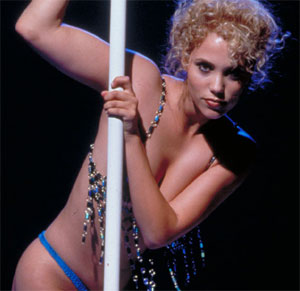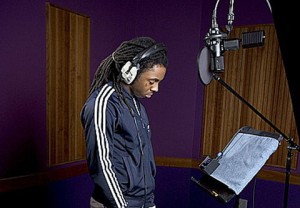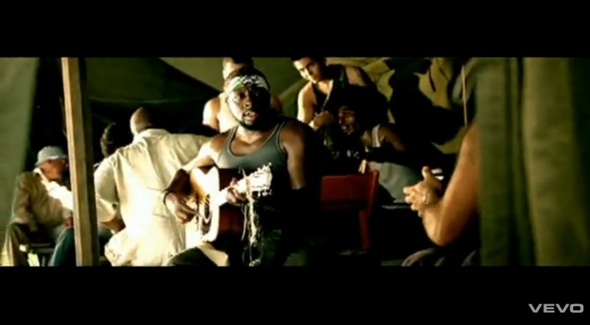Here’s Akon’s verse:
Living got harder, ’cause ho’s got smarter
On the strip is something they don’t want to be a part of
Rather be up in the club shaking for a dub
Get triple times the money and spending it like they wanna.
Here Akon brings up one of the most tragic concepts in economics – the idea of opportunity costs. The real cost of a good, in microeconomic theory, isn’t expressed by the money you spend on it, but in the lost opportunity to spend money on other things. This is also how we measure the cost of time, energy, attention and other things that are harder to quantify in dollar dollar bills (y’all). Going to a mediocre college may save you tuition, but it may cost you the opportunity for a better job down the road. Working a lucrative job may make you a lot of money, but it might cost you the free hours after work to pursue your creative passions. Those are opportunity costs.
The Sweetest Girl is making money by using her body. She’s making money as a prostitute: an illegal, exhausting, dangerous enterprise, for which more than half of her income will go to a pimp. She could also make money as a dancer in a club: not without its risks, but substantially safer than whoring and also more lucrative. So her continued career as a hooker is actually costing her all the money she could be making as a dancer. Even when she’s stacking paper, she’s losing paper.

Maximizing her marginal utility.
(Why can’t she become a dancer? Presumably because her pimp has his hooks in her, either through psychological abuse, threats of violence or drug addiction. Also, she’s been “bruised up, scarred hard,” as Wyclef told us in an earlier verse, which makes it harder to land an audition)
They got their mind on they money, money on they mind
Finger on the trigger, hand on the nine
See everyday they feel the struggle, but stay on the grind
And ain’t nobody takin’ from us and that’s the bottom line
The line “mind on their money, money on their mind” comes from West Coast hip hop. It has several sources: most listeners will recognize it from the chorus of Snoop Dogg and Dr. Dre’s party anthem “Gin & Juice.” Tupac also drops that rhyme in that format (up through the “… hand on the nine” part) in a guest verse on an MC Breed joint.
I mentioned before how the first verse and the chorus establish this song’s debt to the images of East Coast hip hop. Now in the second verse, we cross to the West Coast. Wyclef and Akon have cast as wide a net as possible for their imagery. Fans of either Brooklyn or Compton will recognize something in these lyrics. Again, that effect is deliberate: they want a message that any rap fan can recognize. All that’s left is the Dirty South.
Speaking of …
… sorry to let the beat drop here, but I must confess to something that longtime OTI readers know already: I don’t think much of Lil’ Wayne. I don’t think he’s a very talented performer, I don’t think his lyrics are very good, and I think his level of hip-hop misogyny transcends what we can normally tolerate. This has earned me no end of grief in the Overthinking It clubhouse, lodged in the branches of Yggdrasil (the highest tree in the Hundred Acre Wood), but I stand by it.
I bring it up here because I just cannot find anything to Overthink about Lil’ Wayne’s lyrics in this song. Nothing doing.

Damn. I just got told.
But Lil’ Wayne’s presence does complete the circle of hip-hop between the East Coast and West Coast. By incorporating the Dirty South, this song now touches on every major faction of hip-hop. The story is universal.
So we have our complete lyrical picture. Wyclef, Akon and Lil’ Wayne are telling the story of one girl in particular – the Sweetest Girl. But in doing so, they’re recounting the epic journey of every young woman hustling on the streets. It’s a story of institutional abuse and opportunity costs. It’s a story that most of hip-hop – a genre dominated by males – has overlooked. It is, as the Grandmaster said, the sad sad song of why they live so fast and die so young.
But it’s not about a prostitute.

This was great interpretation. And this is about the only rap song I’ve heard where the woman isn’t property or a problem, so I appreciate you spotlighting it.
Fantastic, but I’m holding you to writing that blues/hip-hop article eventually. (Or for Fenzel to shoehorn it into an entirely different article.)
All right, Internet, consider the gauntlet thrown. Can you overthink Lil Wayne’s verse?
I’ll even save you the trouble of looking it up on lyricsfreak:
———
She used to be the sweetest girl ever (whatever)
Now she like Sour Amaretto
She wears a dress to the T like the letter
And if you make it rain she will be under the weather
She used to run track back in high school
Now she tricks off the track right by school
She takes a loss cos she don’t wanna see her child lose
So respect her, or pay up for the time used
And then she runs to the pastor
And he tells her there will be a new chapter
But she feels no different after
And then she asks him… Where the money at?
“Around me” and “including me” are different concepts. There is a division between ones environment and oneself inherent in the phrase; at the same time there is a link between the words to make the phrase, much like the link between environment and self. The division between environment and self, as well as the unification, come through perception and experience – products of education, both books smarts and street smarts, and are all notable contrasts.
Wyclef’s introduction to the sweetest girl, who he once would do anything for due to primal urges, is a contrast between his lack of education as a youth and his education as a man. The result of this education is that whilst he can appreciate that the world around him is about the papers, and that he must interact with it as such, he need not be such a complete slave to it. He can serve higher ideals, such as overthinking the circumstances of others and helping them if possible – in the first instance it is the sweetest girl and in the second it is the refugee, but the most important is the audience whom he is trying to educate.
The lyrics of Lil’Wayne are all about contrast. This is both in terms of individual lines, couplings, and the entirety. The line “she use to be the sweetest girl ever (whatever)” is a contrast between pleasant (sweet) and unpleasant (whatever), though the overall image is pleasant. The next line contrasts unpleasant (sour) and pleasant (amaretto) in a reversal, with the overall image being unpleasant – this contrasts with the first line. The following lines can be creatively interpretted in this manner; i.e. the dress is curvy, the letter T is not, sexy dressed up vs unhealthily under the weather.
The series of twelve lines expressed by Lil’Wayne further contrasts at the halfway mark. The first six explore how she was and how she now is, and do so without compassion – this is most pronounced is in the first two lines with “whatever” and “sour” which do little to promote sympathy, and are keeping with past Hip Hop expressions for prostitutes. The following six however explore her on a more compassionate level, pronounced by her reasons (her child) and a command for respect, unlike most Hip Hop lyrics. Lil’Wayne further contrasts her fall from grace with her attempt to regain it, though with the result being she progresses to a victimiser – like her pimp, she’s demanding money.
Lil’Wayne himself offers further contrast. As noted, he is not an immigrant and he is arguably the odd one out in terms of style and subtlety. Just as Lil’Wayne completes the circle of hip-hop, he also completes the circle of education – the victims (we who need to be educated), the victimisers (those who take advantage of the uneducated), and those who have transcended this through being educated and educating others (all to varying degrees). Of note is that Wyclef is now running for President whereas Lil”Wayne is in prison. The placement of Lil’Waynes lyrics in the song are in line with the process, with the end lyrics being the attempt to educate others, just as the singers have been educated by others.
::slow clap::